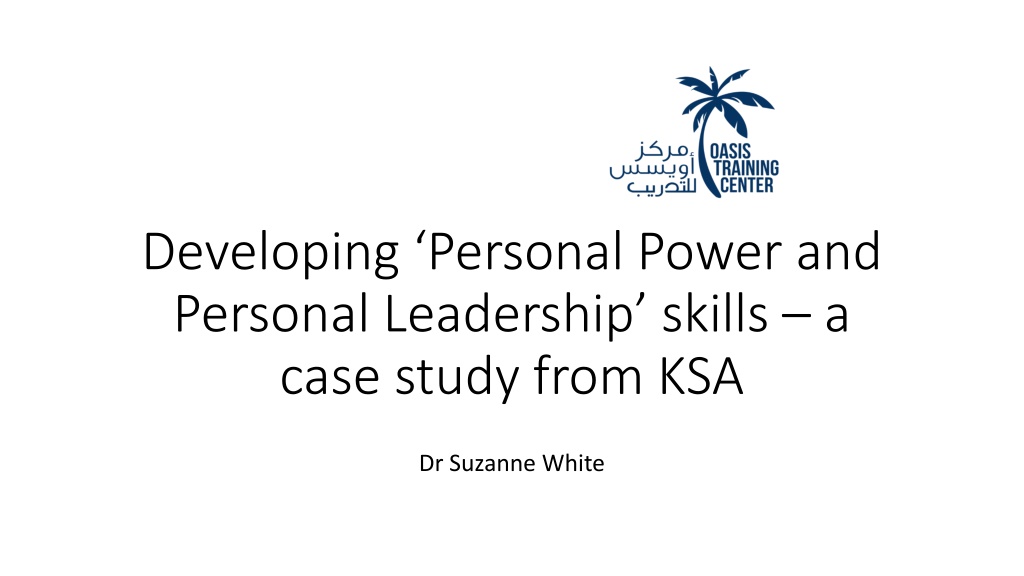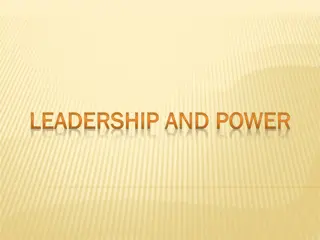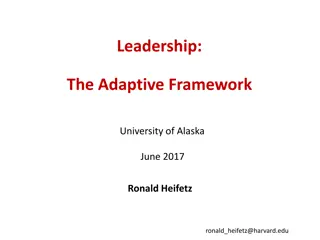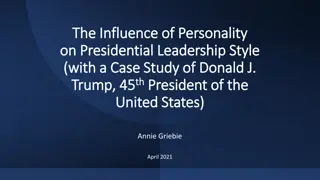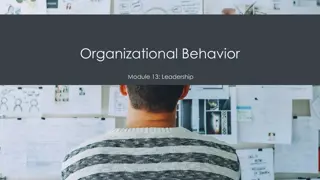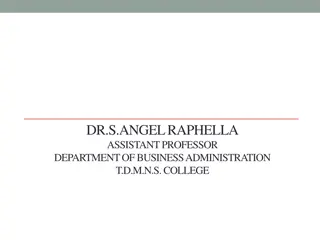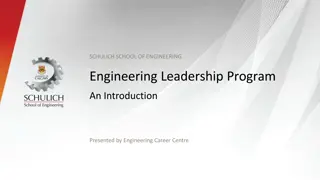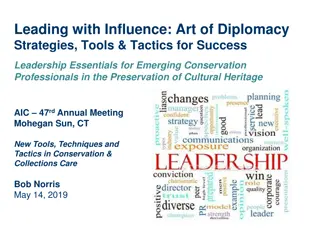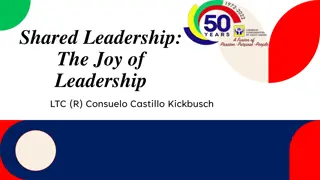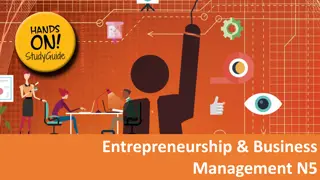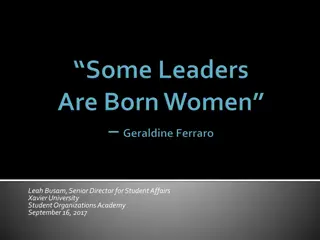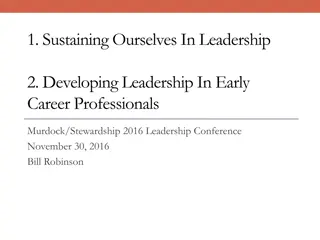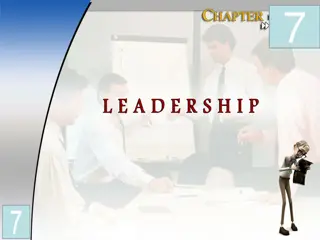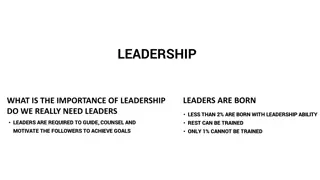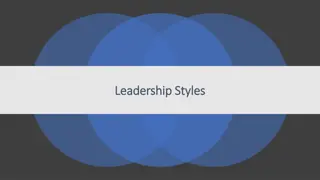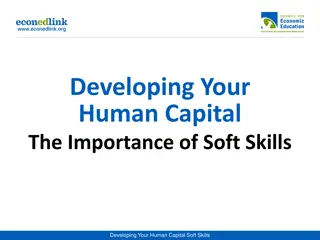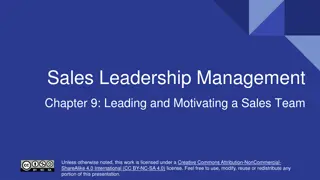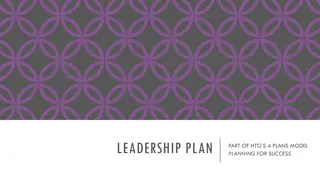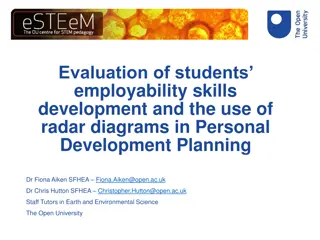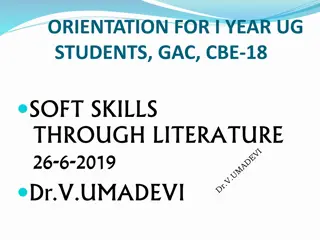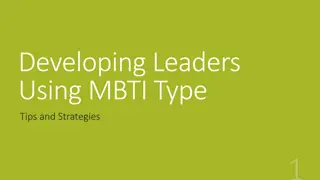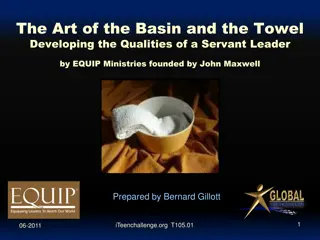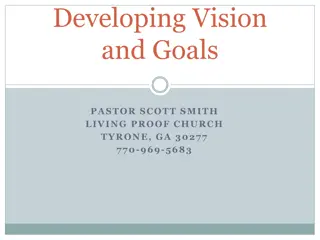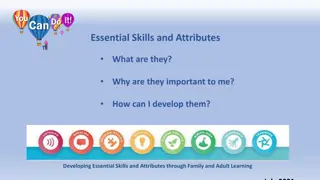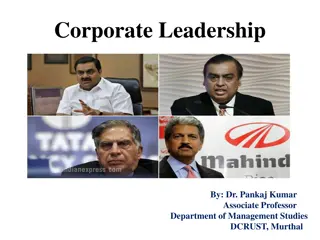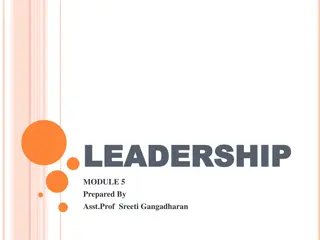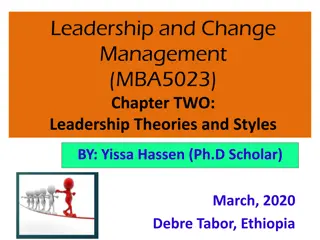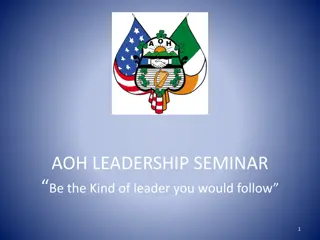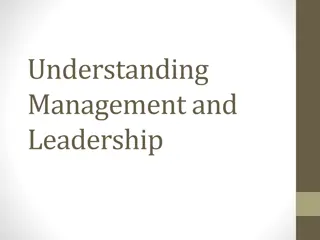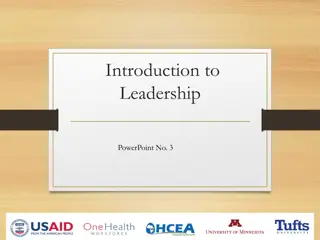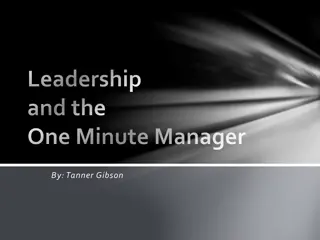Developing Personal Power and Leadership Skills: A Case Study from KSA
This case study explores the development of personal power and personal leadership skills in a Saudi company aiming to enhance employee readiness and mindset. It delves into the concepts of personal power and leadership, outlining the workshop agenda, background of the company, and the aims of the workshop for participants.
Download Presentation

Please find below an Image/Link to download the presentation.
The content on the website is provided AS IS for your information and personal use only. It may not be sold, licensed, or shared on other websites without obtaining consent from the author. Download presentation by click this link. If you encounter any issues during the download, it is possible that the publisher has removed the file from their server.
E N D
Presentation Transcript
Developing Personal Power and Personal Leadership skills a case study from KSA Dr Suzanne White
Agenda Background Personal Power Personal Leadership The workshop Conclusion
Background Greenfield joint venture between a Saudi oil company and an American chemical company Company of 4,500 employees Average age of employees is 29, 70% Saudis, first/second job Less than 1% are women Company not happy with the skills of graduates who are not work- ready Needed an intervention to change mindset as company wants to be seen as a game-changer
Personal Power Personal power is based on strength, confidence and competence that individuals gradually acquire in the course of their development. It is self-assertion, and a natural, healthy striving for satisfaction and meaning in one's interpersonal world. This type of power represents a movement toward self-realization and transcendent goals in life; its primary aim is mastery of self, not others.. (Psychology Today)
Personal Leadership Leadership is frequently thought of in terms of our ability to understand and direct our outer environment people, organizations and events. But recent scientific research from a range of disciplines psychology, neuroscience, medicine and psychotherapy is yielding powerful evidence that a leader s success is substantially influenced by another dimension of leadership, Personal Leadership, consisting of our ability to understand and direct our inner environment our goals & values, our mindsets & emotions, and our positive & destructive drives. Some of the most crucial skills in life have to do with how well we can manage this inner environment under ever-changing outer circumstances. How can we cultivate a winner s mindset that will allow us to perform at our optimum all the time? How can we stay true to our core values despite the pressure to compromise? Prof. Hitendra Wadhwa, Columbia Business School
Aims of the workshop For participants (performance objectives), it was intended to develop a vision of the professional they wish to become in terms of their identity, significance and competence, to inspire them to implement concrete action plans to optimise their strengths and address gaps, increase self-awareness as a foundation for realising their full potential as a distinctive employee in a game-changing company and become aware of how they learn and how to increase their capacity to learn from experience.
For the business The workshop was intended to achieve, for the business, a shift in employee perspective to take full responsibility for their contribution to business results, the impact of their behaviour, and their own development. It was also intended to enable employees to feel empowered to develop themselves and capable of identifying their strengths and development needs on an on-going basis. Finally, to increase engagement levels by involving employees in shaping the company culture.
Structure of the workshop The workshop looked at participants ability to self-manage in terms of four levels: Physical wellbeing (the body)- looking at whether or not they took sufficient self-care and effectively managed stress Psychological/ self-awareness- looking at awareness of own motives, values and assumptions and how they habitually relate to other people How they make sense of the world the way they learn and how they make meaning of experience particularly through sensory data Spirit and Purpose (why I m here) their personal purpose
The workshop used the metaphor of learning as a journey to identify their: Identity what they value, stand for, motivated by, are excited by, what they find difficult or challenging Significance the vision they want to achieve, how powerful they want to be, the legacy they want to create Competence the extent to which their particular knowledge, skills and abilities are currently aligned with their identity and significance
Methodology No tables, powerpoint slides or material Action learning, coaching and experiential exercises
Outcomes from the workshop Over a period of 2 years, and with over 700 employees going through the program, the culture of the company changed. The program inspires and empowers people to craft for themselves a personal vision of the future and teaches proven strategies to bridge the gap between their desired vision and the current reality. 99% of participants were fully satisfied with the experience and 98% felt that it was a life changing experience. Many commented that it was the first time an employer had allowed them to spend 4 days working on themselves, to understand why they behave and think the way they do and to consider what they can change in order to improve performance.
Outcomes for women While less than 1% of the workforce were female, 40 attended the workshop Within 6 months of attending the workshop, over half of the females had been promoted, compared with less than 5% of men All of the women who were promoted cited the workshop as the single most important contributing factor to their promotion, in their view 70% of the women who attended the program requested mentoring/coaching in order to continue their journey , compared with just 3% of the men
Conclusion Personal empowerment enables young GCC men and women to take control of their lives and achieve their ambitions. By bringing about a change in mindset, from job taker to job makers, young people can improve performance in their organisations and be on track for a successful and rewarding career. This is beneficial to companies as well, as it leads to organizations being able to improve their overall performance and being able to sustain it for longer periods of time.
Thank you! We would be pleased to answer any questions you may have by email or phone: Suzanne.white@oasistrainingbh.com +973 36390305
